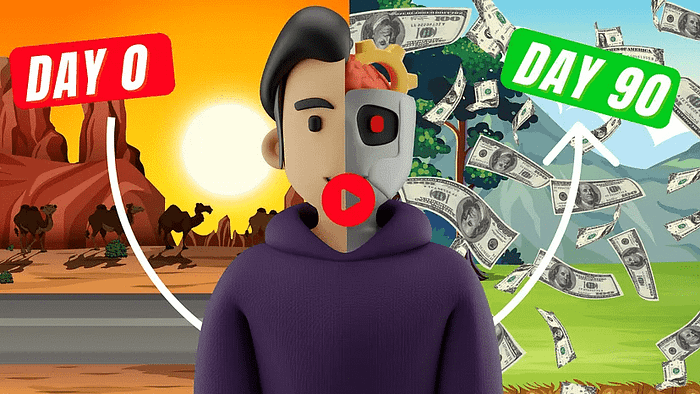AI Marketing Tools: The Game-Changer for Your Sales Strategy
In the fast-paced world of digital marketing, staying ahead of the curve is crucial for businesses looking to maximize their sales potential. As we step into 2024, the landscape of marketing has undergone a significant transformation, with artificial intelligence (AI) playing a pivotal role in reshaping the way companies approach their marketing strategies. AI marketing tools have emerged as a game-changer, empowering businesses to streamline their processes, gain valuable insights, and deliver personalized experiences to their customers. In this article, we will explore 10 cutting-edge AI marketing tools that have the potential to skyrocket your sales in 2024 and beyond.
We strongly recommend that you check out our guide on how to take advantage of AI in today’s passive income economy.
Table of Contents
1. Personalized Email Marketing with AI
Email marketing has long been a staple in the digital marketing toolkit, but with the advent of AI marketing tools, it has reached new heights. Imagine being able to send highly personalized emails to each and every one of your subscribers, tailored to their specific interests, behavior, and preferences. AI-powered email marketing platforms like Mailchimp and ActiveCampaign leverage machine learning algorithms to analyze vast amounts of customer data, enabling businesses to craft compelling email campaigns that resonate with their target audience. By delivering the right message to the right person at the right time, these AI marketing tools can significantly boost open rates, click-through rates, and ultimately, sales.
2. Chatbots for Enhanced Customer Engagement
In the era of instant gratification, customers expect quick and efficient support from businesses. This is where AI-powered chatbots come into play. Chatbots, such as MobileMonkey and ManyChat, are AI marketing tools that simulate human-like conversations, providing instant responses to customer queries and guiding them through the sales funnel. By leveraging natural language processing (NLP) and machine learning, these chatbots can understand and interpret customer intent, offering personalized recommendations and solutions. Not only do chatbots enhance customer engagement and satisfaction, but they also free up valuable time for your sales team to focus on high-value tasks, ultimately leading to increased sales.
3. Predictive Analytics for Targeted Marketing
Data is the lifeblood of modern marketing, and AI marketing tools have revolutionized the way businesses harness its power. Predictive analytics platforms, such as RapidMiner and H2O.ai, utilize advanced algorithms to analyze vast amounts of customer data, uncovering hidden patterns and insights. By leveraging predictive analytics, businesses can identify high-value customer segments, anticipate their needs, and deliver targeted marketing campaigns that drive conversions. These AI marketing tools enable marketers to make data-driven decisions, optimizing their marketing efforts and maximizing their return on investment (ROI).
4. AI-Powered Content Creation
Content is king in the world of digital marketing, but creating engaging and relevant content consistently can be a daunting task. Enter AI-powered content creation tools, such as Articoolo and Quill. These AI marketing tools utilize natural language generation (NLG) techniques to automatically generate high-quality content based on predefined templates and guidelines. From product descriptions to blog posts and social media updates, these tools can save marketers countless hours while ensuring consistency in brand voice and messaging. By leveraging AI for content creation, businesses can scale their content marketing efforts, attract more organic traffic, and ultimately drive more sales.
5. Dynamic Pricing Optimization
Pricing plays a crucial role in influencing customer purchasing decisions, and AI marketing tools have revolutionized the way businesses approach pricing strategies. Dynamic pricing optimization platforms, such as Prisync and Competera, utilize machine learning algorithms to continuously analyze market trends, competitor prices, and customer behavior. Based on these insights, these tools provide real-time price recommendations, enabling businesses to maximize their profit margins while remaining competitive in the market. By implementing dynamic pricing optimization, businesses can adapt to market fluctuations, capture more sales, and boost their bottom line.
6. Personalized Product Recommendations
Personalization is the key to capturing the attention and loyalty of modern consumers, and AI marketing tools have made it possible to deliver highly personalized product recommendations at scale. Recommendation engines, such as Amazon Personalize and Yusp, analyze customer data, including browsing behavior, purchase history, and preferences, to generate tailored product suggestions for each individual user. By presenting customers with products they are more likely to be interested in, businesses can increase average order value, reduce cart abandonment rates, and foster long-term customer loyalty. Personalized product recommendations, powered by AI, have become a critical component of successful e-commerce strategies.
7. Sentiment Analysis for Brand Monitoring
In the age of social media, understanding and managing brand perception is crucial for businesses. Sentiment analysis tools, such as Brandwatch and Sprout Social, leverage AI marketing tools to monitor and analyze online conversations about your brand across various platforms. By utilizing natural language processing (NLP) techniques, these tools can determine the emotional tone and sentiment behind customer feedback, reviews, and mentions. This valuable insight enables businesses to proactively address negative sentiment, identify potential crisis situations, and capitalize on positive brand mentions. By staying on top of brand sentiment, businesses can make informed decisions to enhance their reputation and drive sales.
8. Visual Search and Image Recognition
As visual content continues to dominate the digital landscape, AI marketing tools have evolved to offer advanced visual search and image recognition capabilities. Platforms like Clarifai and Google Cloud Vision API enable businesses to analyze and understand the content of images and videos, opening up new avenues for product discovery and customer engagement. By integrating visual search functionality into their e-commerce websites or mobile apps, businesses can allow customers to search for products using images instead of keywords. This intuitive and interactive approach to product discovery can lead to increased conversions and sales, particularly in industries such as fashion, home decor, and consumer electronics.
9. AI-Powered Ad Optimization
Digital advertising has become increasingly complex, with businesses vying for attention across multiple platforms and channels. AI marketing tools have revolutionized the way businesses optimize their advertising campaigns, ensuring maximum ROI. Platforms like Adext AI and Albert.ai utilize machine learning algorithms to continuously analyze ad performance data, automatically adjusting bids, targeting, and creative elements in real-time. By leveraging AI for ad optimization, businesses can reduce wasted ad spend, improve ad relevance, and ultimately drive more conversions and sales. These tools enable marketers to focus on strategic initiatives while leaving the tedious task of ad optimization to intelligent algorithms.
10. Customer Lifetime Value Prediction
Acquiring new customers is essential for business growth, but retaining and maximizing the value of existing customers is equally important. AI marketing tools have made it possible to predict customer lifetime value (CLV) with unprecedented accuracy. Platforms like Optimove and Custora utilize machine learning algorithms to analyze customer data, including demographics, behavior, and transaction history, to predict the long-term value of each individual customer. By identifying high-value customers and understanding their unique needs and preferences, businesses can develop targeted retention strategies, personalized offers, and loyalty programs that maximize CLV and drive long-term sales growth.
As we navigate the ever-evolving landscape of digital marketing in 2024, AI marketing tools have emerged as indispensable assets for businesses seeking to stay ahead of the competition and skyrocket their sales. From personalized email marketing and chatbots to predictive analytics and visual search, these cutting-edge tools harness the power of artificial intelligence to deliver unparalleled insights, efficiency, and personalization. By leveraging these AI marketing tools strategically, businesses can streamline their marketing efforts, engage customers on a deeper level, and ultimately drive unprecedented sales growth. As the future unfolds, embracing AI in marketing will no longer be a choice but a necessity for businesses that want to thrive in the digital age.
Frequently Asked Questions (FAQ)
What is an AI marketing tool?
An AI marketing tool is a software solution that leverages artificial intelligence technologies, such as machine learning, natural language processing, and predictive analytics, to automate, optimize, and enhance various aspects of marketing. These tools help businesses make data-driven decisions, personalize customer experiences, and improve the efficiency and effectiveness of their marketing efforts.
How can AI be used in marketing?
AI can be used in marketing in numerous ways, including:
- Personalization: AI can analyze customer data to deliver personalized content, product recommendations, and experiences.
- Predictive analytics: AI can predict customer behavior, identify high-value segments, and optimize marketing strategies accordingly.
- Content creation: AI can assist in generating content, such as product descriptions, social media posts, and email subject lines.
- Ad optimization: AI can optimize ad targeting, bidding, and placement to maximize ROI and minimize wasted ad spend.
- Chatbots: AI-powered chatbots can provide instant customer support, guide users through the sales funnel, and enhance engagement.
- Sentiment analysis: AI can monitor and analyze brand sentiment across social media and online platforms to inform reputation management strategies.
What is the best AI for influencer marketing?
Some of the best AI tools for influencer marketing include:
- Upfluence: An AI-powered influencer marketing platform that helps businesses identify, analyze, and collaborate with relevant influencers.
- Affable.ai: A data-driven influencer marketing platform that uses AI to provide insights into influencer performance, audience demographics, and brand affinity.
- Klear: An AI-based influencer marketing solution that offers influencer discovery, campaign management, and performance tracking capabilities.
- Influencer.in: An AI-driven influencer marketing platform that helps businesses find, engage, and manage influencer partnerships at scale.
What is the best AI tool for making ads?
Some of the best AI tools for creating and optimizing ads include:
- Persado: An AI-powered platform that generates high-performing ad copy and optimizes ad creative for various channels and platforms.
- Pattern89: An AI-driven tool that analyzes ad performance data and provides actionable insights to optimize ad creative, targeting, and placement.
- Adext AI: An AI-powered advertising optimization platform that automatically adjusts ad targeting, bids, and budgets to maximize conversions and ROI.
- Albert.ai: An AI-driven advertising tool that autonomously executes and optimizes ad campaigns across multiple channels, including social media, search, and display.
- Pencil: An AI-powered ad creative platform that generates, tests, and optimizes ad visuals and copy for improved performance.

We strongly recommend that you check out our guide on how to take advantage of AI in today’s passive income economy.




